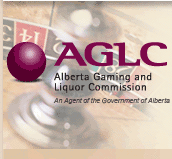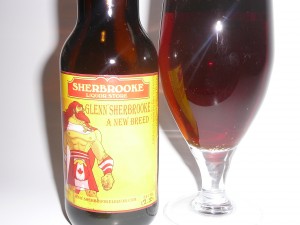 In a news release today (which you can read here) the Alberta Gaming and Liquor Commission (AGLC) announced it is lifting the ban on beer higher than 11.9% alcohol, which was imposed just 20 days ago. Once again beer of any alcohol content can be sold in Alberta liquor stores.
In a news release today (which you can read here) the Alberta Gaming and Liquor Commission (AGLC) announced it is lifting the ban on beer higher than 11.9% alcohol, which was imposed just 20 days ago. Once again beer of any alcohol content can be sold in Alberta liquor stores.
Instead, the AGLC will tax high alcohol beer at the same level they tax spirits. Beer between 12 and 16 will be taxed at $4.05 per litre, while 16-22 percent beer will be at $9.90. Over 22 percent will be taxed at $13.30. There is no change to the tax structure for beer under 12%, which is between $.20 and $.98 per litre, depending on the brewery’s production level (Alberta-based small brewers receive a preferential tax rate). Most beer in Alberta is taxed at the $.98 level.
Without question these are big jumps. Taxes on the next batch of Glenn Sherbrooke, just to take one example, would be 4 times higher, likely almost doubling the cost per bottle. The price impact on high end imports is harder to calculate, given the variable of transport costs and import fees, but I can imagine they will be noteably higher.
The speed of the turnabout suggests the AGLC felt a lot of heat over this decision. The mixture of recurrent media coverage, lobbying from liquor agents, breweries and liquor stores and angry emails from consumers. To get out from under the deluge, they flip-flopped, hopefully recognizing that the original policy was poorly thought out. The new policy is far from perfect, but does seem to more appropriately get to the legitimate problem of the alcoholic energy drinks in the States – adding $10 per litre to those low-priced products might kill the buzz pretty quickly – without preventing beer lovers from sampling a bottle of Sam Adam’s Utopia or BrewDog’s latest squirrel beer (see here if you miss that reference).
In a way the policy has a logic to it. The new tax rate looks at alcohol content rather than ingredients list, meaning tequila, rye, flavoured vodka, etc. all sit on a level playing field with big beer. Ultimately government liquor policy can’t prevent unhealthy alcohol consumption. That is a broader societal issue. All the AGLC can do is make sure its policies don’t unfairly target one particular group. On that level, the new policy may succeed.
What will the new policy achieve? Well, a couple of things. First, I think it will delay the introduction of the dastardly beer-based energy drinks, although I imagine someone, someday will figure out a loophole. Second, the price of boutique beer will go up, potentially a lot, further entrenching Alberta’s reputation as the most expense province to buy beer (read here for more on that).There may be a small dampening of demand for high alcohol beer, but it won’t be huge as most high end beer drinkers have sufficient disposable cash to weather an extra $5-$10 on a bottle of something rare and special. Theoretically it might reduce the availability of these kind of beer, as agents might be nervous about the higher price point, but I think that will wear off quickly and things will return to normal.
Some folks will be angry at the extra taxes and the price hike that ensues, arguing government should get out of the business altogether. They have a right to feel that way, but I don’t share that particular opinion. Taxes are necessary and, most of the time, deliver important things to our society. We all want taxes to be lower on things we like and higher on things we don’t like. I like beer. Of course I would like to save a few bucks through lower taxes. But at what expense? I don’t want health care or education funding cut, and some of the things I want to see taxed more – cigarettes for example – affect other people in our society.
But enough politics. I think it is a time for each of us to pull out a bottle of our favourite 12%+ beer and (responsibly) celebrate this reversal. This is a nice, albeit small, example of how public mobilization can work. We should remember that the next time the government tries to privatize Medicare (Oops. Snuck some politics back in there, naughty me.)


December 16, 2010 at 6:37 PM
Neil and I were talking earlier, his quick calculations indicated that Glenn will jump from $4.99 retail to $5.99. Hopefully he’s right, and not you.
I would suggest that a continued lobbying would not go amiss, as the purported target of the original ban has been left comepletely unscathed, and the innocent bystanders continue to be victimized.
Net effect of this will be to sell fewer bottles of higher priced products. I see this all the time. I sell more bottles of a $5.00 beer than I do a $10. And more of those than a $20.
The important point to this, I think, is that it’s NOT as level as you think. Do you mix beer?
December 16, 2010 at 10:10 PM
Maybe this should be a sign to us in the good beer movement that if we get riled up about something, we can get the government to listen. Anyone have an idea about a next high horse to get up on?
December 16, 2010 at 10:53 PM
The government is now enforcing the law for needing a spirits license to produce >11.9%. So, breweries who got away with it before will no longer be able to sneak it through.
December 16, 2010 at 11:49 PM
I’m not necessarily opposed to paying more for high alcohol beer, but can anyone tell me if wines over 11.9% are also taxed similarly? If so, then fine. If not, then we still have a legitimate complaint, and if they try and tax higher alcohol wines, we can get a lot more lobbyists on our side.
@Owen: The next high horse? How about shipping beers across the border? As homebrewers, we want to be able to ship our beers to US competitions (we have qualifiers for MCAB and AHA, but we can’t “legally” ship them there). Not to mentions, it would be nice to have access to the companies in the US that have “Beer of the Month” clubs (not to mention many Belgian companies that would be willing to ship online products to Canada, if not for Canadian customs stopping them).
December 17, 2010 at 9:57 AM
I am not sure what international wine is taxed, but Canadian wines have no excise.
December 17, 2010 at 10:13 AM
Ernie, if you click here you can see the full AGLC markup schedule: http://aglc.ca/pdf/quickfacts/markup_rates_schedule.pdf
All wine up to 16% is taxed at a flat rate of $3.45 per litre. Wine that’s over 16% jumps to $6.10 per litre. For the record, I’ve never seen a table wine over 16% alcohol: that’s pretty much the ceiling for table wine – the yeast dies off around that percentage so you can’t really get higher unless you add alcohol. So, only sake and fortified wines like port and sherry are above 16%.
Under the new schedule, high alcohol beer is indeed taxed more than wine – beer that checks in between 11.9% and 16% is taxed at $4.05 per litre, 60 cents more than wine in the same range. Once beer hits 16%, it is taxed on par with spirits of the same range.
The discrepancy in the taxes on wine and beer under 16% is confusing to me – I’d like to know their reasoning behind it.
On a side note, Canada has the highest taxes on beverage alcohol in the entire world. We charge almost double the taxes on booze that are charged in the second country on that list (New Zealand).
December 17, 2010 at 10:39 AM
Clearly there is a lot here to ponder, and my rushed post only gets the discussion started.
First, it clearly will take a bit of time to see how the new tax rate affects beer prices. Jim seems to suggest it will be small, but I have received an email from a rep who is looking at 15 to 29% hikes in their wholesale price – even before retailer markup. They are quite concerned about that dampening demand. Part of the problem is that none of us really know how high-end beer consumers react to price increases. I know it won’t make me switch to Coors Light (HA!) but might it cause us to buy 2 bottles instead of 4? Or only buy it one time, and not go back for seconds? I don’t know.
Second, Mel has her facts exactly right (Mel, you beat me by a few minutes with that info). I suspect the discrepancy is that the AGLC simply didn’t think about wine. There is a hell of a lot of knee-jerking going on over there and while syncing beer and spirit taxes has some logic, to make it truly fair, wine would need to be included as well. So, upon reflection that does make me revise my statement that they are taxing alcohol content and not ingredients – clearly we are not there yet.
Third, to Owen’s suggestion of our next “horse”, I say we demand better enforcement of the rules preventing inducements, tied taps and other bribes. They are a huge hurdle between us and getting good beer in pubs.
Thanks for all the comments, everyone.
Jason
December 17, 2010 at 12:12 PM
The rep for Mikkeller said that Big Worst (a 17.6% barleywine) will go up $46 per case for him, which would probably equate to additional $5 per bottle on the shelf. As a result, he doesn’t anticipate bothering to even bring it in any more, which is a shame, as it’s one of my favorites. Already one casualty from this law.
Also, this is the response I just got from Sherman Hanowski at the AGLC when I asked about the difference between beer and wine:
“Wine has its own mark-up rates, which is $3.45 per litre for wines that have alcohol strength less than or equal to 16% and $6.10 per litre for alcohol strength over 16%.
Beer or malt liquor , as defined in the Excise Act means all fermented liquor that is brewed in whole or in part from malt, grain or any saccharine matter without any process of distillation and that has an alcoholic strength not in excess of 11.9% absolute ethyl alcohol by volume, but does not include wine as defined in section 2 of the Excise Act, 2001.
The beer or malt liquor with an alcoholic strength greater than 11.9% alcohol by volume is considered an imitation spirit and the spirit excise duty rates apply.
The Excise Act, 2001 does not place any restrictions on the alcohol content of the wine and therefore does not consider wine greater than 11.9% alcohol by volume an imitation spirit.”
December 18, 2010 at 2:16 AM
The bigger issue is, that the Federals have started that beer with 11.9% is now an imitation spirit – which of course the AGLC and all other Liquor Boards should follow.
My opinion would be to find out who named it “imitation spirit” and start lobbying on that side now.
anyone in for that?